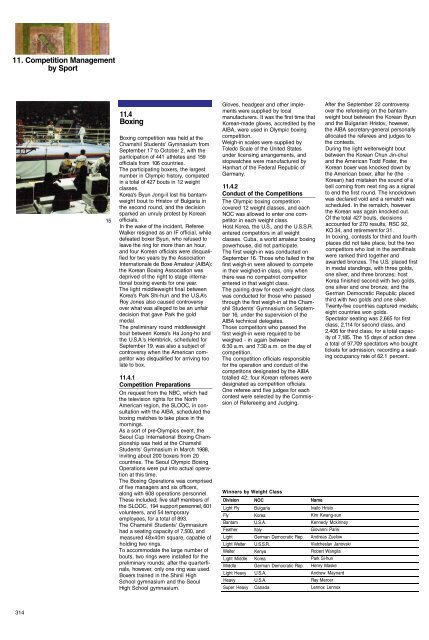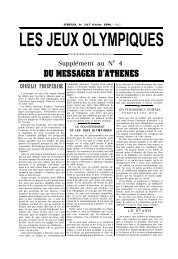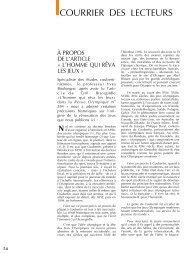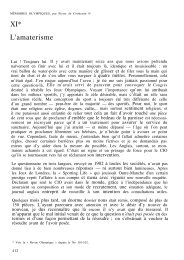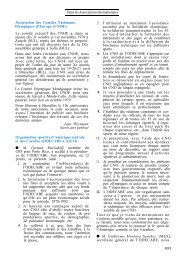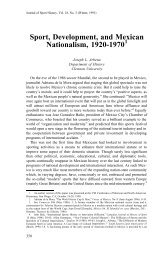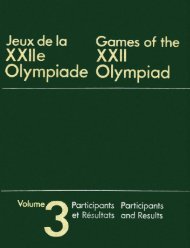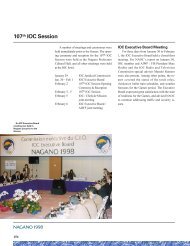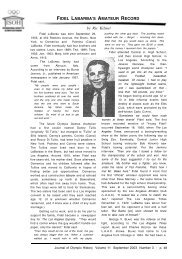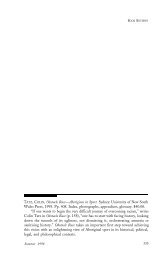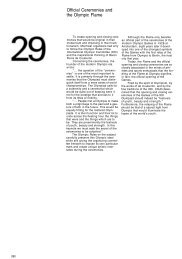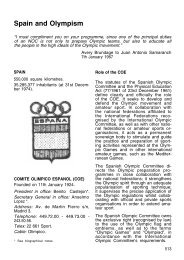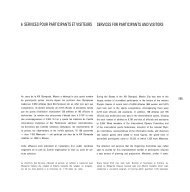Part 2 - LA84 Foundation
Part 2 - LA84 Foundation
Part 2 - LA84 Foundation
Create successful ePaper yourself
Turn your PDF publications into a flip-book with our unique Google optimized e-Paper software.
11. Competition Management<br />
by Sport<br />
314<br />
15<br />
11.4<br />
Boxing<br />
Boxing competition was held at the<br />
Chamshil Students' Gymnasium from<br />
September 17 to October 2, with the<br />
participation of 441 athletes and 159<br />
officials from 106 countries.<br />
The participating boxers, the largest<br />
number in Olympic history, competed<br />
in a total of 427 bouts in 12 weight<br />
classes.<br />
Korea's Byun Jong-il lost his bantamweight<br />
bout to Hristov of Bulgaria in<br />
the second round, and the decision<br />
sparked an unruly protest by Korean<br />
officials.<br />
In the wake of the incident, Referee<br />
Walker resigned as an IF official, while<br />
defeated boxer Byun, who refused to<br />
leave the ring for more than an hour,<br />
and four Korean officials were disqualified<br />
for two years by the Association<br />
Internationale de Boxe Amateur (AIBA);<br />
the Korean Boxing Association was<br />
deprived of the right to stage international<br />
boxing events for one year.<br />
The light middleweight final between<br />
Korea's Park Shi-hun and the U.S.A's<br />
Roy Jones also caused controversy<br />
over what was alleged to be an unfair<br />
decision that gave Park the gold<br />
medal.<br />
The preliminary round middleweight<br />
bout between Korea's Ha Jong-ho and<br />
the U.S.A.'s Hembrick, scheduled for<br />
September 19, was also a subject of<br />
controversy when the American competitor<br />
was disqualified for arriving too<br />
late to box.<br />
11.4.1<br />
Competition Preparations<br />
—————————————–<br />
On request from the NBC, which had<br />
the television rights for the North<br />
American region, the SLOOC, in consultation<br />
with the AIBA, scheduled the<br />
boxing matches to take place in the<br />
mornings.<br />
As a sort of pre-Olympics event, the<br />
Seoul Cup International Boxing Championship<br />
was held at the Chamshil<br />
Students' Gymnasium in March 1988,<br />
inviting about 200 boxers from 20<br />
countries. The Seoul Olympic Boxing<br />
Operations were put into actual operation<br />
at this time.<br />
The Boxing Operations was comprised<br />
of five managers and six officers,<br />
along with 608 operations personnel.<br />
These included; five staff members of<br />
the SLOOC, 194 support personnel, 601<br />
volunteers, and 54 temporary<br />
employees, for a total of 893.<br />
The Chamshil Students' Gymnasium<br />
had a seating capacity of 7,500, and<br />
measured 48x40m square, capable of<br />
holding two rings.<br />
To accommodate the large number of<br />
bouts, two rings were installed for the<br />
preliminary rounds; after the quarterfinals,<br />
however, only one ring was used.<br />
Boxers trained in the Shinil High<br />
School gymnasium and the Seoul<br />
High School gymnasium.<br />
Gloves, headgear and other implements<br />
were supplied by local<br />
manufacturers. It was the first time that<br />
Korean-made gloves, accredited by the<br />
AIBA, were used in Olympic boxing<br />
competition.<br />
Weigh-in scales were supplied by<br />
Toledo Scale of the United States<br />
under licensing arrangements, and<br />
stopwatches were manufactured by<br />
Hanhart of the Federal Republic of<br />
Germany.<br />
11.4.2<br />
Conduct of the Competitions<br />
—————————————–<br />
The Olympic boxing competition<br />
covered 12 weight classes, and each<br />
NOC was allowed to enter one competitor<br />
in each weight class.<br />
Host Korea, the U.S., and the U.S.S.R.<br />
entered competitors in all weight<br />
classes. Cuba, a world amateur boxing<br />
powerhouse, did not participate.<br />
The first weigh-in was conducted on<br />
September 16. Those who failed in the<br />
first weigh-in were allowed to compete<br />
in their weighed-in class, only when<br />
there was no compatriot competitor<br />
entered in that weight class.<br />
The pairing draw for each weight class<br />
was conducted for those who passed<br />
through the first weigh-in at the Chamshil<br />
Students' Gymnasium on September<br />
16, under the supervision of the<br />
AIBA technical delegates.<br />
Those competitors who passed the<br />
first weigh-in were required to be<br />
weighed - in again between<br />
6:30 a.m. and 7:30 a.m. on the day of<br />
competition.<br />
The competition officials responsible<br />
for the operation and conduct of the<br />
competitons designated by the AIBA<br />
totalled 42; four Korean referees were<br />
designated as competition officials.<br />
One referee and five judges for each<br />
contest were selected by the Commission<br />
of Refereeing and Judging.<br />
Winners by Weight Class<br />
Division<br />
Light Fly<br />
Fly<br />
Bantam<br />
Feather<br />
Light<br />
Light Welter<br />
Welter<br />
Light Middle<br />
Middle<br />
Light Heavy<br />
Heavy<br />
Super Heavy<br />
NOC<br />
Bulgaria<br />
Korea<br />
U.S.A.<br />
Italy<br />
German Democratic Rep.<br />
U.S.S.R.<br />
Kenya<br />
Korea<br />
German Democratic Rep.<br />
U.S.A.<br />
U.S.A.<br />
Canada<br />
Name<br />
Ivailo Hristo<br />
After the September 22 controversy<br />
over the refereeing on the bantamweight<br />
bout between the Korean Byun<br />
and the Bulgarian Hristov, however,<br />
the AIBA secretary-general personally<br />
allocated the referees and judges to<br />
the contests.<br />
During the light welterweight bout<br />
between the Korean Chun Jin-chul<br />
and the American Todd Foster, the<br />
Korean boxer was knocked down by<br />
the American boxer, after he (the<br />
Korean) had mistaken the sound of a<br />
bell coming from next ring as a signal<br />
to end the first round. The knockdown<br />
was declared void and a rematch was<br />
scheduled. In the rematch, however<br />
the Korean was again knocked out.<br />
Of the total 427 bouts, decisions<br />
accounted for 270 results, RSC 92,<br />
KO 34, and retirement for 31.<br />
In boxing, contests for third and fourth<br />
places did not take place, but the two<br />
competitors who lost in the semifinals<br />
were ranked third together and<br />
awarded bronzes. The U.S. placed first<br />
in medal standings, with three golds,<br />
one silver, and three bronzes; host<br />
Korea finished second with two golds,<br />
one silver and one bronze; and the<br />
German Democratic Republic placed<br />
third with two golds and one silver.<br />
Twenty-five countries captured medals;<br />
eight countries won golds.<br />
Spectator seating was 2,665 for first<br />
class, 2,114 for second class, and<br />
2,406 for third class, for a total capacity<br />
of 7,185. The 15 days of action drew<br />
a total of 97,709 spectators who bought<br />
tickets for admission, recording a seating<br />
occupancy rate of 62.1 percent.<br />
Kim Kwang-sun<br />
Kennedy Mckinney<br />
Giovanni Parisi<br />
Andreas Zuelow<br />
Viatcheslav Janovski<br />
Robert Wangila<br />
Park Si-hun<br />
Henry Maske<br />
Andrew Maynard<br />
Ray Mercer<br />
Lennox Lennox


